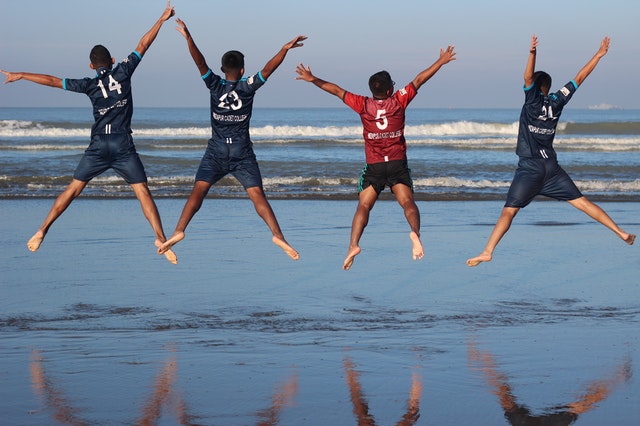Singlehood, for many, may not feel like a centered space, particularly on Valentine’s Day. That’s because our culture sees singlehood as a means to an end, a bump on the road to a relationship, a state of incompleteness. When single, we often feel pressure to grasp for something more. It can be hard, then, to appreciate what being single offers. So, instead, we skitter on the relationship treadmill.
Being on the relationship treadmill means you’re consumed by romance and frantically seeking or focusing on a romantic partner(ship). When on it, you aren’t present with or grateful for being single, and your life feels lacking. A study from the U.K. found that the average young adult spends 10 hours a week on dating apps (imagine if we spent that time on an actual treadmill! The gains!), suggesting that many single folks hustle on the treadmill.
The relationship treadmill means single people often engage in what researchers call “compulsive use of dating applications.” It’s akin to dating app addiction: using dating apps not intentionally but compulsively and being unable to quit or reduce time spent on them. The more we compulsively use dating apps, another study finds, the more likely we are to neglect other important things in our lives like work, school, and our other relationships.
Getting off the relationship treadmill means settling into singlehood, finding peace within it. We can do this whether we want a relationship eventually or not. When off the treadmill, we see a relationship as something that might add to an already fulfilling life, rather than as something to compensate for a lacking one.
Here are practical tips for getting off the relationship treadmill:
1. Ask yourself what being single offers you and pursue its offerings:
Maybe being single allows you to travel more than if you had to consider a partner’s schedule, or pursue hobbies and interests. It can also be a mindset: delighting in the ways you choose all the home décor, or sleep or wake up at any time. Identify the offering and if applicable, pursue it.
2. Cultivate friendships:
People say they’re worried single people will be alone forever. But being single does not mean being alone. For single people, friendship is a great offering. Studies find that single people have more friends and spend more time with them; singlehood can be a friendship jackpot.
In fact, one study found that while married people tended to be slightly happier than single people, a very social single person is actually happier than the average married person. We all need connection in our lives, but there are many ways to find it. Some of us opt for a spouse, and others for friendship and either, this study suggests, can be fulfilling.
3. Use dating apps with intention or not at all:
It’s possible to get off the relationship treadmill and still date. It just means dating from a centered place, rather than to compensate for loneliness, depression, or emptiness. This looks like being fine alone if you don’t find someone who adds to your life meaningfully. It also means setting boundaries with people you’re dating if they treat you poorly because you prioritize your own peace over finding a partner (and will only settle for a partner who adds to your peace).
A treadmill has a single track, so if you’re off it, you’re cultivating many life tracks—hobbies, friends, family—while dating. In contrast, when you’re on the treadmill, your romantic status is disproportionally impacting the track of your self-worth.
Conflating our self-worth with the status of our romantic relationship is called relationship contingent self-esteem, and it is related to more negative emotions and social anxiety, and less general self-esteem, but it is also related to slightly more satisfaction and commitment to our romantic relationship. When people are high in it, they experience no more positive emotion when things go right in their romantic relationship, but more negative emotion when things go wrong.
To get off the relationship treadmill, when you can’t date in a centered, self-loving, grounded way, then you don’t date. When you feel a desire to compulsively join a dating site, ask yourself what emotions you’re soothing through the app. Acknowledge and feel them, until they pass. Recognize that, given you’re in a vulnerable place, when online dating, you’re seeking a short-term high at the cost of your long-term well-being, since you’re not in the right place to enter a loving, stable, partnership.
Couples on the Relationship Treadmill
Plot twist: If you are partnered, you can still be on the relationship treadmill. If you focus on your romantic partnership and neglect friends, interests, and your identity outside of the relationship, you’re on the relationship treadmill. This phenomenon is on the rise. One study found that between 1980 and 2000, couples became less likely to engage in activities outside their coupledom, like visiting friends or going out.
What’s so bad about that? You might wonder. According to science, making one person your everything harms ourselves and our relationship. People are more resilient to negative events within their romantic relationship when they have friends (particularly for women who tend to have stronger friendships), one study found. Another study titled “the importance of a few good friends” found that when we get into conflict with a spouse, we experience more harmful patterns of stress hormone secretion, but only if we don’t have good friends outside the marriage.
Getting off the relationship treadmill means living a balanced life. It’s a life where the search for or presence of a romantic partner doesn’t eclipse all life’s other beauties, like friendship. Many of us were raised to look for someone to be “our everything.” Perhaps, instead, we can look at a romantic partner as a significant but singular tile in our larger mosaic of happiness.
Note: This article also appears on my blog for Psychology Today.
For more on friendship, order my book Platonic: How the Science of Attachment Can Help You Make- and Keep -Friends.




